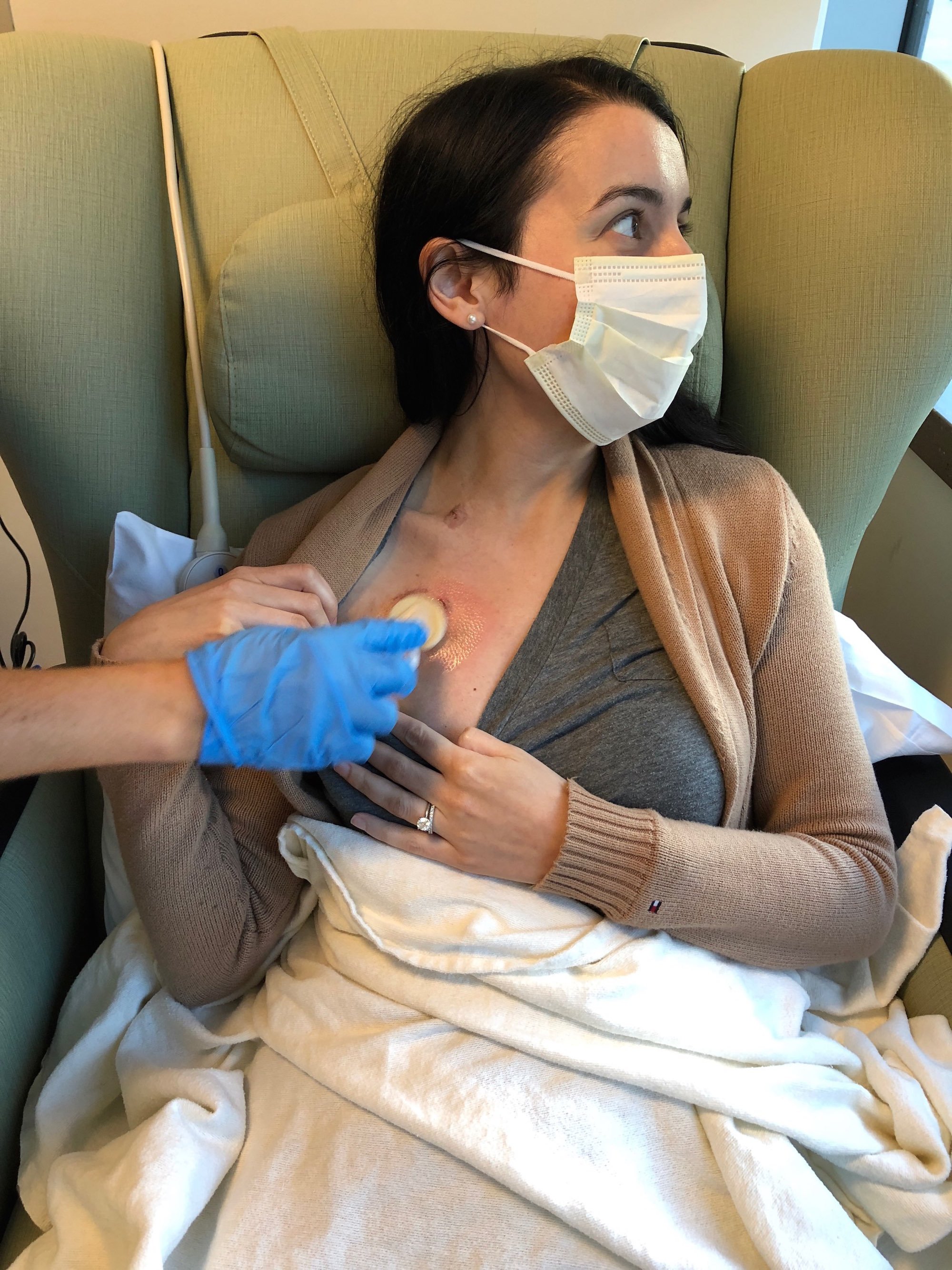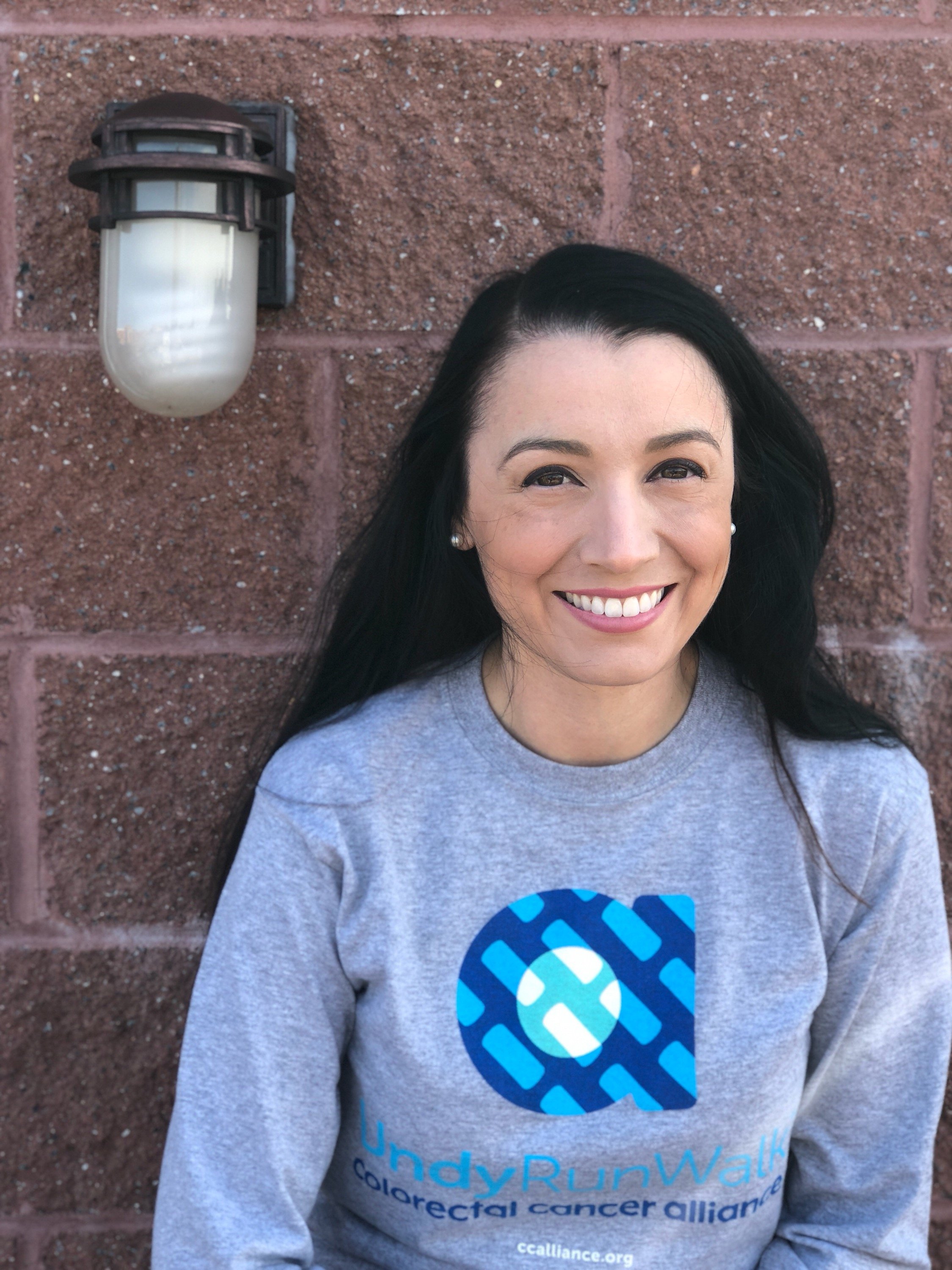In the fall of 2016, Diana Zepeda realized she’d been calling in sick to work more frequently than ever before. She was experiencing severe stomach cramps, but didn’t think anything of it. “I pretty much ate from a food truck for lunch every day, so having a full day of stomach cramps was expected,” she says.
The following January, after turning 33, Zepeda’s symptoms worsened. She chalked it up to being older; after all, some of her friends found that they felt better by eliminating certain ingredients from their diets. Hoping to feel better, she modified her diet, and cut out dairy, grains, and sugar for a month.
It didn’t help. In February, she started seeing blood in her stools. So Zepeda turned to the internet, and given her symptoms, realized she needed to see a gastroenterologist, a doctor who specializes in diseases of the digestive tract. “But, like most people in DC, I’m a transplant, so I didn’t have a doctor. It was easy to avoid for a long time.”
Finally, Zepeda found a highly rated gastroenterologist who was also female, which was important to Zepeda, and despite the two-month wait, made an appointment. Around Memorial Day, Zepeda went in, had some testing, and a few days later received a call. To her relief, her doctor told her it was “just a bug”–E.coli, a bacteria found in contaminated food or water that can cause diarrhea.
But when her symptoms worsened to the point of constantly needing to go to the bathroom, she saw her doctor again. Same test, same result. So her doctor scheduled a colonoscopy. Zepeda thought what most people her age might think: “I’m 33. Why do I need a colonoscopy?”
Colonoscopies are largely regarded as the gold standard in colon cancer screening, says Michael Sapienza, CEO of the Colorectal Cancer Alliance, whose mother passed away from colon cancer on Mother’s Day in 2009. To prepare, patients are given laxatives the day prior. “The laxative had zero effect on me, which I knew was weird,” Zepeda says. She experienced such a severe reaction, with cramping, nausea, and vomiting, that her husband took her to the emergency room, where she was given fluids and monitored for a few hours. Despite knowing she was preparing for a colonoscopy, Zepeda says, the ER doctors wouldn’t do any scans, telling her that she was a young woman of reproductive age, and it was too much radiation for her abdomen. They sent her home.
The next day, June 20, 2017, her GI doctor got her in for a sigmoidoscopy, or partial colonoscopy, since she wasn’t fully prepared for the colonoscopy. Her doctor saw the tumor right away. It was slightly larger than a golf ball. Zepeda was diagnosed with stage 4 colon cancer.
“The first thing I did when I was diagnosed is I Googled ‘average age for females to be diagnosed with colon cancer.’ And it said 72.
“You always read in magazines, I never thought it’d happen to me. And now I’m that person in the magazine saying, I never thought it’d happen to me.”

Colon cancer is the third most commonly diagnosed cancer among both men and women in the United States. Although the majority of new cases occurs in people 65 or older, 45 percent of men and 39 percent of women are younger than 65 years when diagnosed, according to a 2017 landmark paper by Rebecca Siegel, MPH, of the American Cancer Society. This same paper also concludes that more research is needed to determine why colon cancer is increasing in young adults. In fact, between 1994 and 2012, colon cancer has increased by 51 percent in those ages 20-49, according to the National Colorectal Cancer Roundtable.
“I’m an old guy, and when I trained, you didn’t even talk about colon cancer under the age of 50. It was a disease for old folks,” says Dr. John Marshall, director of the Otto J. Ruesch Center for the Cure of Gastrointestinal Cancer at Georgetown University. According to Marshall, incidence of colon cancer is rising among young people who are actually quite healthy, which runs contrary to known risk factors such as obesity and lack of exercise, often seen in those diagnosed over 50. “It’s marathon-running, cardboard-eating patients,” he says. “They’re doing everything right, and they’re still getting colon cancer.”
Why is this happening? As of now, there are no definitive answers. But one leading theory, says Marshall, starts with the microbiome, the harmonious community of bacteria that calls our bodies home. The microbiome decides whether something is allowed in or not, while also preventing the immune system from attacking itself. Marshall likens it to a coral reef, positing that we’ve in some way “whitewashed” it with modern health habits, like taking antibiotics as a child, washing our hands too much, or not eating enough plants. If you don’t have a diverse coral reef, harmful things can pass through and lead to disease.
While research on the microbiome and colon cancer in young adults is still emerging, there has been a positive shift in the medical community when it comes to screening and diagnosis. “I think we’ve made some progress in altering the thinking,” says Marshall, referring to communication with ER doctors and primary care physicians. “You’ve got to ignore what you learned in medical school. When young people have altered symptoms—cramping, diarrhea, bleeding—this should be taken seriously.”
However, he adds that this is not some widespread epidemic. The important point is, “What we’re seeing is colon cancer where we used to never used to see it—in this steady flow of younger folks.”

Last July, a month after her diagnosis, Zepeda had her colon removed, along with tumors that had spread to her liver. She’s nearing the end of a six-month chemotherapy regimen, “which has been miserable,” she says. On the one hand, she wants nothing more than to be done with chemo. But on the other, “I’m very scared to leave this bubble of care.”
Once a month, Zepeda attends a support group for other young people with cancer. She doesn’t consider herself a “support group person,” but realized it’s helpful to be around other people her age with similar worries, like fertility and career trajectory, and ask, “Are you still working through your treatments? Am I screwed for the rest of my life because I had to take nine months off?” And she’s scared about going back to work. “I feel like it’ll be hard to chit-chat about the weather and Netflix.”
Because her cancer reached stage 4, she won’t be in the clear for five years once she wraps up her last round of chemo. She’s mostly hopeful that she doesn’t have a recurrence. What would she tell those who might be worried that their symptoms are more serious than a stomach bug? “Just go to the doctor. If I would’ve gone sooner, I probably wouldn’t have gone to stage 4.”
March is National Colon Cancer Awareness Month. Help raise awareness on Sunday, March 18, at the 13th Annual ScopeItOut 5K, presented by the Colorectal Cancer Alliance. Coincidentally, this year’s race is held on National Awkward Moments Day, so let’s get talking.
from Health - Google News http://ift.tt/2IuFDGA
No comments:
Post a Comment